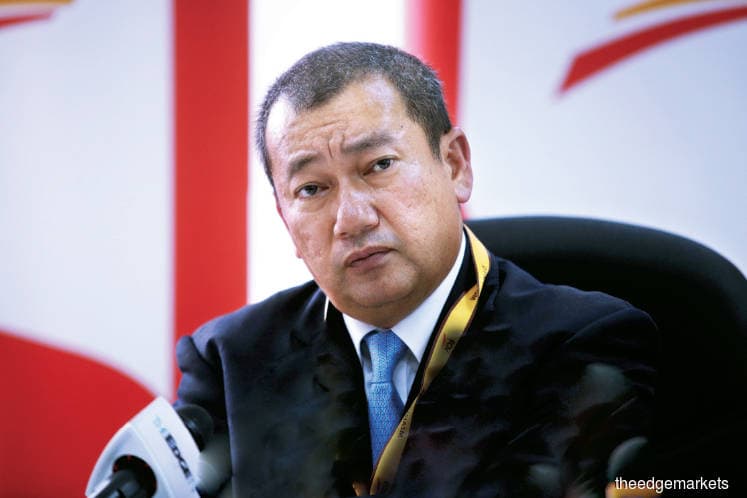
KUALA LUMPUR (April 30): FGV Holdings Bhd, whose CPO production fell 30% year-on-year in the first quarter of this year, is expecting its crude palm oil production to chart "a significant improvement" in the second quarter of this year, as the impact of historically poor weather abates.
But what is uncertain is the impact on demand that the Covid-19 pandemic will have, as several of the group's traditional markets remain closed or partially closed at this time, said FGV chaiman Datuk Wira Azhar Abdul Hamid.
The group's CPO production stood at 514,000 metric tonnes (MT) in 1Q2020, compared with 1Q2019's 762,000 MT, as fresh fruit production declined to 712,000 MT from 1,055,000 MT previously.
He said the group's CPO production in 1Q2020 was adversely affected — particularly in Sabah — due to a number of factors such as previous dry spells. Lower prices through most of 2019 also affected overall smallholder productivity.
"January and February were the toughest months, but as the trend started correcting in March, the impact of the Covid-19 pandemic affected operations and productivity, again more in Sabah than elsewhere. In Sabah, FGV closed five mills in March and April, purely as a precautionary measure and to ensure the well-being of those employees who would need to come into contact with outsiders. All our other mills throughout the country continued to operate albeit with reduced manpower.
"Going forward, as production picks up, the industry will be looking to traditional markets to assess the impact on demand as a result of the pandemic," Azhar said in a letter to shareholders filed to Bursa Malaysia this evening.
"While most analysts are bearish on the sector in the shorter term, expectations are that the longer-term outlook for the traditional uses of palm will stabilise. Questions will remain on the biodiesel sector, though FGV’s exposure in this area is minimal, with 2.6% of total production used for biodiesel in 2019," he said.
In the letter, Azhar also recounted how he was upbeat when he last wrote to shareholders in January, as the group had put in place plans to diversify its revenue base from the plantation sector, from 82% dependence on palm oil, by introducing a new strategic pillar — integrated farming and renewables.
"Under integrated farming, we had identified complementary food crops and dairy farming for contract farmers and for FGV to optimize its own land use planning. Under renewables we had identified energy, animal feed and paper products as revenue streams, each allowing us to capitalize on the lucrative palm based circular economy, to maximise value creation efforts," he said.
Had the pandemic not wreaked its havoc across the world, he said he would be happily updating shareholders on how these plans were coming to along, with new products introduced into the market.
"However, things have changed... To say that the situation is uncertain or challenging, or even both, would be to downplay the severity of the impact, and more critically, the potential aftermath, of the near global shut down we are in the middle of. FGV, with 50,000 employees and plantation workers, more than 150,000 small farmers in our supply chain and plugged into the global markets as we are, has not been spared," he said.
Going forward, he shared his belief that there are times when the best thing to do is to go back to basics.
"FGV is predominantly a supplier of essential goods and services — mainly cooking oil, sugar and the logistics support needed to store and move goods around the country. In other words, FGV is already in the business of producing and providing one of the basic needs of humankind — food. However, we need to do more," he said.
He outlined how the company could do this by being faster and more efficient, think and work differently, and focus on improving its supply chain. The group must also identify and grow new revenue streams.
"At the same time, we must expand our focus beyond oil and sugar. We must recognise that we are part of a dynamic region with more than 600 million people and a further 2.8 billion in China and India, within easy reach. We must identify ways and means to produce quality food crops for Malaysians at more affordable prices and to help reduce the country’s food import bill.
"If we need to move beyond fresh food, to canned or processed food with longer shelf lives, we must be nimble enough to move into the space, either directly or through partnerships," he said.
The "good news", he said, is that several of the measures he described are already part of the group's strategic shift towards becoming a major player in the food industry.
"Thus, the plans are in place and steps are already being taken to move the company forward. The bad news is, we no longer have the luxury of time to execute our plans. We have to do it now," he said.
On that note, he pledged his commitment to shareholders that FGV's board and management will work through this crisis and the impending challenges after the Movement Control Order is lifted. "We will focus on our goals, and we will deliver."
Shares in FGV closed 1.73% or 1.5 sen lower at 85 sen today, giving it a market capitalisation of RM3.10 billion. It saw 16.09 million shares traded.
Read also: